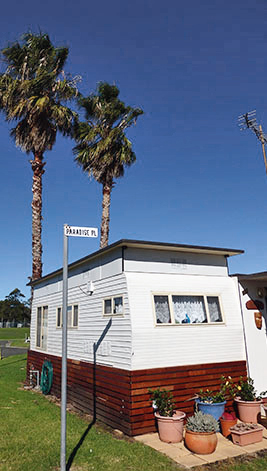Wills and probate in land lease communities – Appeal Panel settles disputes
23/02/2022

Note: An updated version of this article can be found here.
In a recent decision of the Appeal Panel the question of whether a home can be sold without a grant of probate has been answered. Probate is the name of a court order granted by the Supreme Court of NSW. Being granted probate confirms that the will is valid and the named executor (legal personal representative) has permission to distribute the estate of the deceased according to the provisions in the will.
In Barrack Point Holdings Pty Ltd v Jenkins (No 2); Jenkins v Barrack Point Holdings Pty Ltd [2022] NSWCATAP 10 the Appeal Panel determined an appeal by the operator and a cross appeal by Lee Jenkins, beneficiary and executor of the estate of the late Alvin Jenkins.
The dispute arose between the parties following the death of Alvin Jenkins in March 2019. Alvin was a home owner at Surfrider Caravan Park on the New South Wales south coast at the time of his death. He had occupied his home on site 4 under a site agreement. Alvin’s final will and testament named his son Lee Jenkins as sole beneficiary and executor of the estate.
Lee asked the operator of Surfrider if they could advertise and sell the home on his behalf. The operator’s response was that they couldn’t list the home for sale, or enter into a site agreement with a purchaser until a grant of probate had been obtained.
For various reasons Lee did not obtain a grant of probate until 4 August 2020 and by this time a considerable amount of site fees were owing on the site.
Mr Jenkins applied to the Tribunal for compensation for site fees paid on the basis the operator had interfered with the sale of the home. The Tribunal found there had been interference and awarded Mr Jenkins compensation of $2,845.80 for site fees between March 2019 and 4 August 2019 (which the Tribunal erroneously recorded as the date probate was granted). Neither party was happy with this outcome and both lodged appeals against the decision.
The Appeals
The operator appealed on six grounds including that the Tribunal had failed to properly interpret the definition of “home owner” in the Residential (Land Lease) Communities Act 2013 (RLLC Act) and had failed to properly consider the operator’s decision to require a grant of probate.
Mr Jenkins appealed on the basis the Tribunal erred in determining the date of probate and in calculating the damages he was awarded.
The decisions
The Appeal Panel determined the Tribunal was correct to find that Mr Jenkins was a “home owner” within the meaning of the RLLC Act. It said “The RC Act confers rights under that Act on those defined as a home owner. In the present case they are a “personal representative or a beneficiary of the estate”. In either case, Mr Jenkins fits within the definition and is therefore a home owner for the purpose of the RC Act.”
Regarding whether the operator interfered with Mr Jenkins’ right to sell the home, the Appeal Panel found that statements made (to Mr Jenkins) by the operator could constitute interference. Additionally, declining to advertise the property and/or act as agent was also conduct that could amount to interference within the meaning of s107 (RLLC Act).
On the issue of whether the operator’s actions caused Mr Jenkins to suffer a loss the Appeal Panel differed from the Tribunal. It found the operator was entitled to insist upon a grant of probate prior to signing a transfer of the existing site agreement to a prospective purchaser or entering into a new site agreement with a prospective purchaser “because without such a grant the operator would be at risk of dealing with the estate property inappropriately. Similarly, acting as agent and promoting a sale on behalf of Mr Jenkins prior to the grant of probate may also have placed the operator at risk of liability to prospective purchasers concerning statements made.”
The Appeal Panel said “it seems to us that the identified conduct, although constituting interference, did not relevantly cause the loss and damage in question to be suffered. Rather, it remained for Mr Jenkins, who had independent legal advice, to appoint his own selling agent and obtain probate and thereby facilitate a sale at an earlier point in time.”
The Appeal Panel found the Tribunal had erred in awarding compensation to Mr Jenkins. It set aside the order for compensation and dismissed Mr Jenkins appeal.
This article was published in Outasite Lite 42. Subscribe here.
